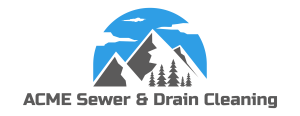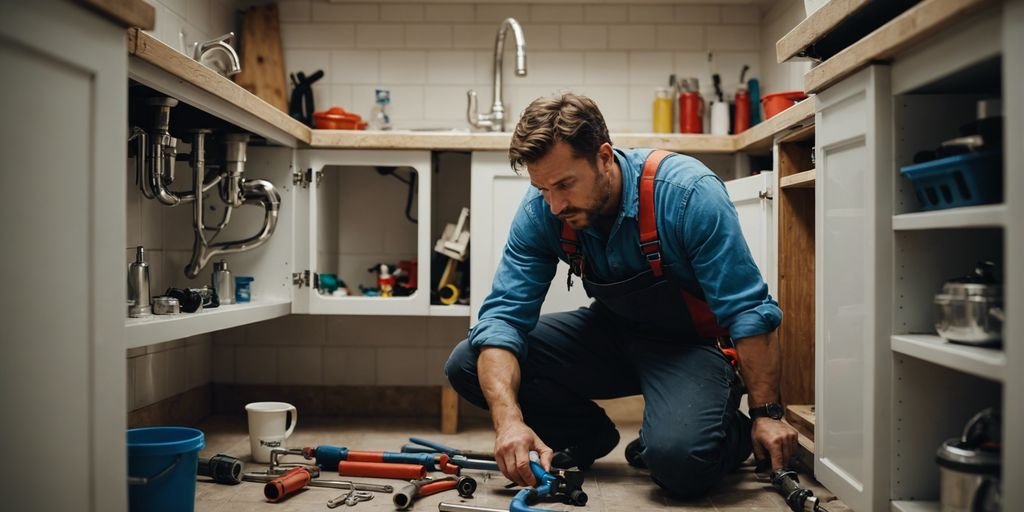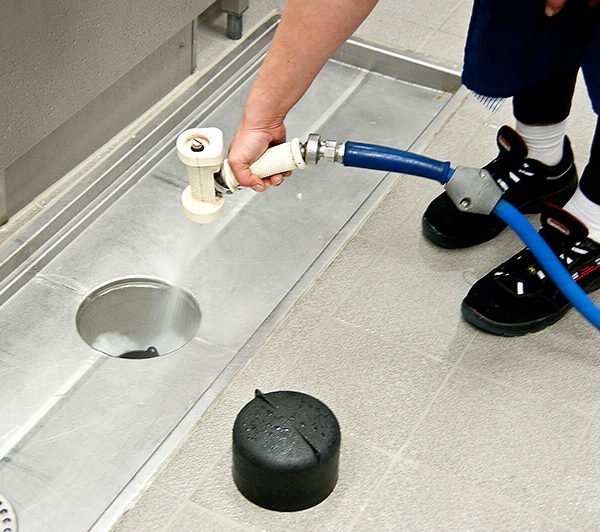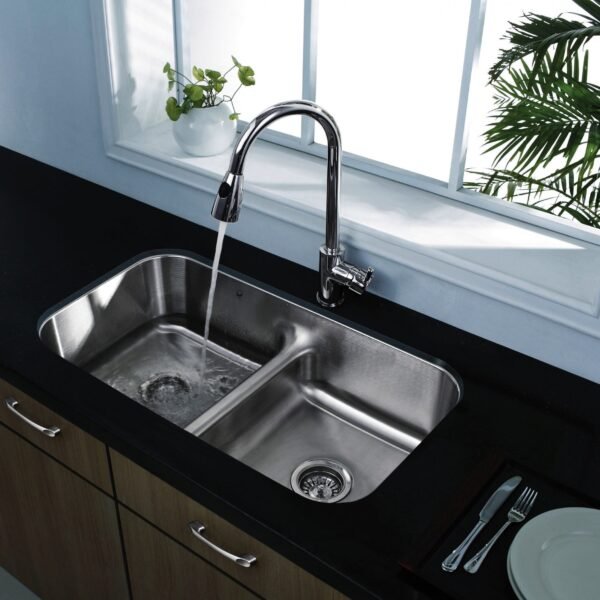Plumbing emergencies can be a homeowner’s worst nightmare, causing significant damage and inconvenience. However, many of these emergencies can be prevented with regular maintenance and proper care. ACME Sewer & Drain Cleaning, experts in emergency plumbing, offer valuable tips to help you avoid unexpected plumbing disasters. By being proactive and following these guidelines, you can save yourself time, money, and stress.
Key Takeaways
- Regular plumbing inspections are crucial for identifying wear and tear, leaks, and issues with pipe joints.
- Proper disposal of waste, such as avoiding flushing non-biodegradable items and safely disposing of grease, can prevent clogs and backups.
- Maintaining water pressure by detecting low pressure, cleaning faucet aerators, and checking for hidden leaks helps ensure a functional plumbing system.
- Seasonal plumbing maintenance, including winterizing pipes and performing spring check-ups, prepares your system for changing weather conditions.
- Having an emergency plumbing kit and knowing when to call a professional can mitigate damage during unexpected plumbing issues.
Regular Plumbing Inspections

Regular plumbing inspections are essential to maintaining a healthy plumbing system and preventing costly repairs. By staying proactive and scheduling routine inspections, you can identify potential issues before they become major problems.
Proper Disposal of Waste
Proper waste disposal is crucial to maintaining a healthy plumbing system and preventing costly emergencies. Be cautious of what you put down your disposal to avoid clogs and backups.
Avoid Flushing Non-Biodegradable Items
Flushing non-biodegradable items such as plastic wrappers or metallic foils can lead to severe blockages. Even items advertised as “flushable,” like certain wipes, often don’t break down like toilet paper and can cause clogs.
Safe Disposal of Grease
Never pour oil or grease down the kitchen sink as it can build up in the pipes and block wastewater from flowing out. Instead, collect grease in a container and dispose of it in the trash.
Using Drain Strainers
Using drain strainers can help catch food particles, hair, and other debris before they enter your plumbing system. This simple step can prevent clogs and keep your drains running smoothly.
Maintaining Water Pressure

Maintaining optimal water pressure in your home is crucial for ensuring a steady and reliable water supply. Regular maintenance and timely detection of issues can prevent major plumbing problems.
Seasonal Plumbing Maintenance
Seasonal plumbing maintenance is crucial to ensure your plumbing system runs smoothly throughout the year. Preventative maintenance is the key to avoiding unexpected plumbing emergencies and costly repairs. Here are some essential tips for each season:
Winterizing Pipes
- Insulate pipes to prevent freezing.
- Disconnect and drain outdoor hoses.
- Close the outdoor faucet shut-off valve.
Spring Plumbing Check-Up
- Inspect pipes for any damage caused by winter.
- Check outdoor faucets for leaks.
- Clean gutters to ensure proper drainage.
Summer Water Usage Tips
- Monitor water usage to avoid overloading the system.
- Check for hidden leaks that may have developed.
- Ensure your sewer line is clear of any blockages.
Regular inspections and cleanings can prevent major blockages and extend the lifespan of your plumbing system. Begin by thoroughly inspecting all drains in your home for any signs of clogs or slow drainage.
Handling Minor Plumbing Issues
Minor plumbing issues can often be handled without the need for professional help, saving you time and money. However, knowing how to address these problems effectively is crucial to prevent them from escalating into major emergencies. Here are some common minor plumbing issues and how to handle them:
Fixing Dripping Faucets
A dripping faucet can be more than just an annoyance; it can also lead to higher water bills. Most dripping faucets are caused by worn-out washers or seals. Replacing these components can usually resolve the issue. If you’re not comfortable doing this yourself, expert sink repair services in South Salt Lake, UT, like those offered by ACME Sewer & Drain Cleaning, can provide swift and dependable solutions.
Unclogging Drains
Clogged drains are a common issue in many households. For minor clogs, try a plunger or a drain snake. Boiling water can sometimes help dissolve grease buildup. Avoid using harsh chemical drain cleaners as they can damage your pipes. Instead, consider natural alternatives like baking soda and vinegar. If the clog persists, it might be time to call in professional help. Remember, there are 3 reasons there is water backing up in the kitchen sink: grease buildup, food particles, and foreign objects.
Repairing Toilet Leaks
A leaking toilet can waste a significant amount of water and lead to higher utility bills. Common causes include a faulty flapper, a worn-out fill valve, or a damaged flush valve. Replacing these parts can often fix the problem. If you’re unsure about the repair process, ACME Sewer & Drain Cleaning offers affordable sewer cleanout services in South Salt Lake, UT, ensuring customer satisfaction and property protection.
Don’t panic! A homeowner’s guide to handling minor plumbing issues can save you from costly repairs and water damage. Be proactive and address these issues as soon as they arise.
By following these tips, you can handle minor plumbing issues effectively and maintain the integrity of your home’s plumbing system.
Emergency Plumbing Kit Essentials
Having an emergency plumbing kit on hand can save you from a lot of stress and potential damage. Being prepared for minor plumbing issues can prevent them from escalating into major problems. Here are some essentials to include in your kit:
Tools to Keep on Hand
- Plunger
- Plumber’s tape
- Drain cleaning auger
- Mini sink and drain plunger
- Plumber’s putty
- Pipe wrench
- Pliers
- Bucket
Temporary Fixes
Sometimes, a temporary fix is all you need to prevent a disaster until a professional arrives. For instance, using plumber’s tape to seal a small leak can be a lifesaver. Keep these items in your kit for quick fixes:
- Plumber’s tape
- Rubber gloves
- Rags
- Sealant
When to Call a Professional
While having an emergency plumbing kit is essential, knowing when to call a professional is equally important. If you encounter issues like sewer backups or major leaks, it’s time to contact a professional. ACME Sewer & Drain Cleaning offers expert drain cleaning services and emergency response tailored to your needs.
Remember, being prepared with the right tools and knowing when to seek professional help can make all the difference in handling plumbing emergencies effectively.
Preventing Pipe Freezing
One of the most effective ways to prevent pipe freezing is by insulating your pipes. Foam or fiberglass insulation can be used to wrap pipes, especially those in unheated areas like basements or attics. This helps to maintain a steady temperature around the pipes, reducing the risk of freezing.
Maintaining a consistent temperature in your home is crucial. During extremely cold weather, keep your thermostat set to the same temperature during day and night. This can help prevent cold air from flowing around the pipes and causing them to freeze.
If you suspect that your pipes have frozen, act quickly to prevent them from bursting. First, turn off the main water supply to minimize damage. Then, use a hairdryer or portable heater to gradually thaw the frozen section of the pipe. Avoid using open flames as this can damage the pipes and create a fire hazard.
In case of severe freezing, it’s best to contact a professional plumber to safely address the issue and prevent further damage.
Water Heater Maintenance
Flushing the Tank
Regularly flushing the tank is essential to remove sediment buildup, which can affect the efficiency of your water heater. Perform this task at least once a year to ensure optimal performance.
Checking the Anode Rod
The anode rod helps prevent corrosion inside the tank. It should be checked every three years, or more frequently if you have hard water. If the rod is significantly corroded, replace it to extend the life of your water heater.
Adjusting the Temperature
Setting the water heater temperature to 120°F can prevent scalding and save energy. Use a thermometer to check the water temperature and adjust the thermostat accordingly.
Regular maintenance of your water heater can prevent unexpected breakdowns and ensure a consistent supply of hot water.
Sewer Line Care

One of the first signs of sewer line issues is slow draining in your sinks, tubs, or toilets. You might also notice gurgling sounds coming from your drains or foul odors around your home. If you experience any of these symptoms, it’s crucial to address them promptly to avoid more severe problems.
Tree roots can cause significant damage to your sewer lines. To prevent this, avoid planting trees or shrubs near your sewer lines. If you already have trees close to your sewer lines, consider installing a root barrier to protect your pipes. Regular inspections can also help identify and address root intrusion before it becomes a major issue.
Regular sewer line cleaning is essential to maintain the health of your plumbing system. Schedule annual checks and use camera inspections to identify potential problems early. Avoid blockages by being mindful of what goes down your drains and installing drain strainers. Regular maintenance can save you from costly repairs and ensure your sewer system functions efficiently.
Avoiding Chemical Drain Cleaners
Natural Alternatives
Using natural alternatives to chemical drain cleaners is not only safer for your pipes but also better for the environment. Consider using a mixture of baking soda and vinegar to clear minor clogs. This combination creates a fizzy reaction that can help break down debris. Another option is using a plumber’s snake, which is effective for removing hair and other blockages without the use of harsh chemicals.
Risks of Chemical Cleaners
Chemical drain cleaners can provide a temporary fix but may damage pipes and are hazardous to the environment. Over time, these chemicals can corrode your plumbing system, leading to costly repairs. Additionally, the fumes from these cleaners can be harmful to your health. It’s better to use mechanical methods or professional services for drain cleaning.
Safe Usage Tips
If you must use chemical drain cleaners, follow these safety tips:
- Read the label carefully and follow the manufacturer’s instructions.
- Wear protective gloves and eyewear to avoid contact with the chemicals.
- Ensure the area is well-ventilated to avoid inhaling fumes.
- Never mix different types of chemical cleaners, as this can create dangerous reactions.
For severe blockages, it’s best to contact a professional drain cleaning service. They have the tools and expertise to resolve the issue without causing damage to your plumbing system.
Understanding Your Plumbing System

Understanding the ins and outs of your home plumbing system is crucial for maintaining a healthy and efficient household. From pipes to fixtures, water supply to vents, knowing how your plumbing system works can help you prevent issues before they become emergencies. Your home plumbing system relies on the natural properties of gravity and pressure to ensure the flow of water and the proper disposal of waste.
Conclusion
Preventing plumbing emergencies requires a proactive approach and regular maintenance. By inspecting your pipes and fixtures regularly, addressing minor issues before they escalate, and avoiding improper use of your plumbing system, you can significantly reduce the risk of unexpected problems. Remember, ACME Sewer & Drain Cleaning is always here to help with emergency plumbing services whenever you need them. Don’t wait for a small issue to become a costly emergency—take action today to ensure your plumbing system remains in top condition.
Frequently Asked Questions
What should I do if I experience a sewer line backup?
If you experience a sewer line backup, refrain from using any fixtures connected to the plumbing system. Turn off the main water supply if it’s safe to do so, and contact ACME Sewer & Drain Cleaning for immediate assistance.
How often should I schedule regular plumbing inspections?
It’s recommended to schedule regular plumbing inspections at least once a year. This helps identify potential issues before they become emergencies.
Can I use chemical drain cleaners to unclog my drains?
While chemical drain cleaners can be effective, they pose risks to your plumbing system and the environment. It’s better to use natural alternatives or contact a professional for safe and effective drain cleaning.
What items should I avoid flushing down the toilet?
Avoid flushing non-biodegradable items such as wipes, sanitary products, and paper towels. These can cause blockages and damage your plumbing system.
How can I prevent my pipes from freezing during winter?
To prevent pipes from freezing, insulate them and keep a steady temperature in your home. You can also let faucets drip slightly to keep water moving through the pipes.
What are the signs of low water pressure?
Signs of low water pressure include weak water flow from faucets, slow-filling toilets, and reduced shower pressure. It can be caused by clogged aerators, hidden leaks, or issues with the main water supply.
When should I call a professional plumber?
Call a professional plumber if you notice persistent leaks, water discoloration, low water pressure, or any other signs of plumbing issues. Immediate attention can prevent minor problems from becoming emergencies.
What should be included in an emergency plumbing kit?
An emergency plumbing kit should include basic tools like a plunger, pipe wrench, plumber’s tape, and a bucket. These tools can help you manage minor issues until a professional arrives.




